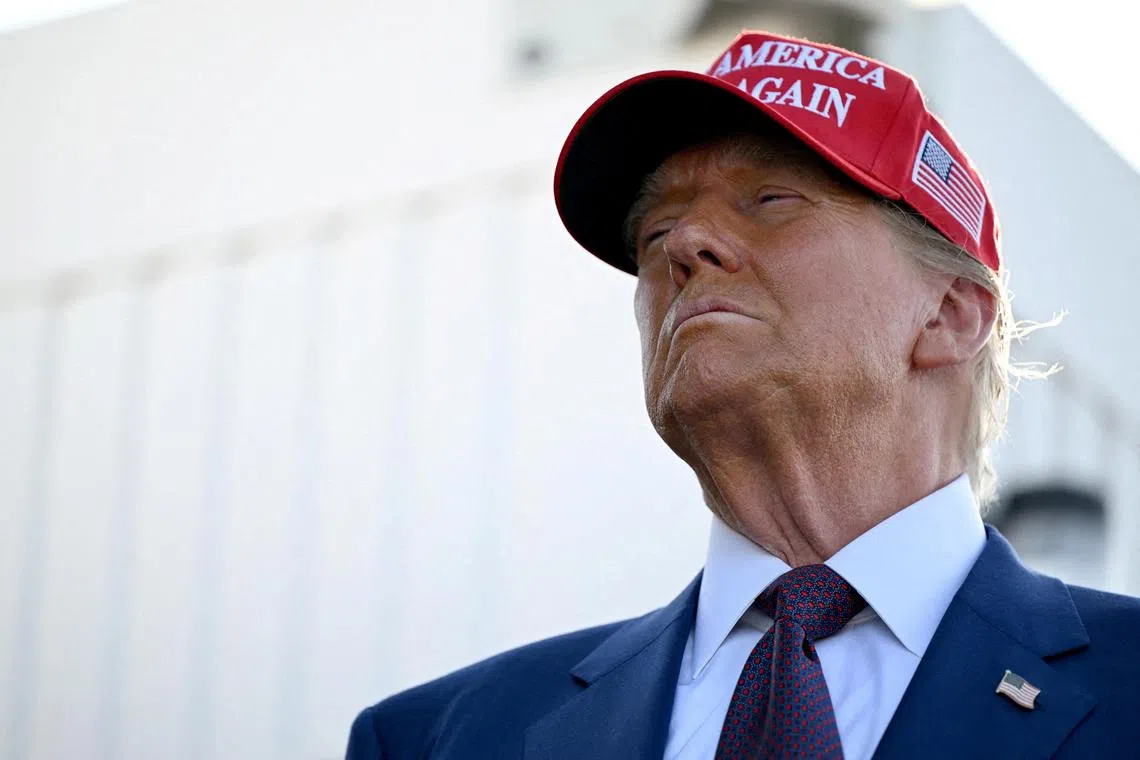Trump may thwart Kim-Putin ambition on economic ties, says study
Sign up now: Get insights on Asia's fast-moving developments

If President-elect Donald Trump manages to end the war in Ukraine, North Korean leader Kim Jong Un’s bet on Russia for economic support may end up backfiring.
PHOTO: REUTERS
Follow topic:
SEOUL – North Korean leader Kim Jong Un’s bet on Russia for economic support may end up backfiring if US President-elect Donald Trump manages to end Russian President Vladimir Putin’s war in Ukraine, according to a study released by a South Korean government-affiliated think-tank.
Moscow has emerged as a prominent supporter of Mr Kim’s regime in 2024 and the two nations have beefed up their economic and military exchanges.
After supplying ammunitions to Russia, Pyongyang has in recent weeks dispatched troops to aid Moscow’s war in Ukraine
In return, Russia is providing money and helping North Korea increase its military capabilities.
The deepening alliance with Mr Putin has given Mr Kim an option to turn less to Beijing for diplomatic support.
But Pyongyang is still heavily dependent on China for its economic needs, according to the study led by Dr Lee Jongkyu, a senior researcher at the Korea Development Institute.
North Korea imports more than 900 different types of products – including trucks and medicine – from China, while it buys only roughly 150 items, such as oil and gas, from Russia.
Investment from Russia has also proven choppy compared with that from China and tourism from Russia is unlikely to jump given most of it involves travel by air rather than land, he said.
“The current situation is the result of a match between the interests of Russia, which needs conventional arms and troops, and North Korea, which needs food, energy, and foreign currency,” Dr Lee said in the monthly KDI publication, adding that this relationship is expected to be strengthened “as long as the war continues”.
“If this war ends in any form, as Trump has pledged, the needs of the two for each other may change.”
North Korea’s military industries may still benefit from cooperation with Russia, but the sector has limited spillover effects for the broader economy and may even interfere with the growth of other areas, he said.
“The ‘all-in’ approach to Russia in the North Korean economy appears to have high opportunity costs in terms of not only quantity but also quality,” he said.
North Korea’s true intent in cosying up to Russia may be more military than economic.
North Korea wants Russian support to procure modern technologies that it has had trouble getting to develop ballistic missiles, submarines and fighter jets, according to Professor Lee Sang-joon from Kookmin University who took part in the study.
That means if Trump’s efforts to end the war drag out, Mr Kim will buy enough time to modernise North Korea’s arms industries while his troops would acquire considerable combat experience in Ukraine, the study said.
Meanwhile, Russia could increase its hiring of North Korean workers to ease its labour shortage, according to the study.
Ms Joanna Hosaniak, who has followed cross-border activity as deputy director-general of the Citizens’ Alliance for North Korean Human Rights, said there was “extremely big competition between China and Russia going on right now” to have economic sway over Pyongyang.
“Russia is exercising this influence through military production that is ongoing from North Korea,” she said on Nov 29 at a press conference in Seoul, while China is exerting this influence through other means.
“Both of these countries were crucial in establishment of the sanctions regime, but they are openly violating this sanctions regime.”
Mr Putin said earlier this week that his forces could strike key sites in the Ukrainian capital of Kyiv with ballistic missiles, indicating his willingness to continue the war.
It remains to be seen how Trump would deal with Mr Kim and his military support for Russia after he takes office in January.
Last week, Mr Kim said past talks with the US merely confirmed Washington’s “unchangeable” hostility

